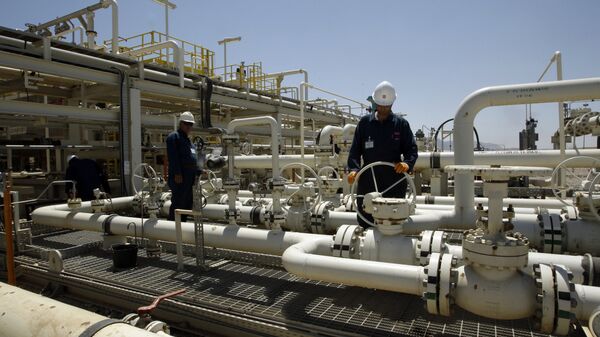ST. PETERSBURG (Sputnik) — The OPEC agreement was supported by 11 non-OPEC states, which joined the deal by promising to jointly reduce oil output by 558,000 barrels per day. Russia pledged to cut production by 300,000 barrels daily. The OPEC has already implemented its commitment while non-cartel countries have implemented over half of the agreed upon cuts.
"Kurdistan referendum has nothing to do with oil prices. This is a political move. I myself think it has a negligible effect on oil prices. It's a purely political move," he said in an interview at the St. Petersburg International Economic Forum (SPIEF).
SPIEF, held in Russia's second largest city of St. Petersburg between Thursday and Saturday, is a major global platform for communication between business representatives and discussion of crucial economic issues. Sputnik News Agency is the official media partner of the forum.
"Hopefully this will make the market more stable… I believe the prices will regain next year," the minister said.
The minister said Baghdad might try again to take the country out of the OPEC deal on capping oil production, depending on how the market will react to the existing freeze.
"We asked before, and we did not succeed to persuade the other members… To keep OPEC strong and to keep the market stable and to keep the prices regaining, we just stopped our efforts. But the door is still open for this," he said in an interview.
The minister said further attempts "depend on how [the] market is, how the outcome of this [oil output] freeze is." "It maybe will be considered at time when we see that there is a lot of disturbance," he added.
"Hopefully this will make the market more stable… I believe the prices will regain next year," the minister said on the sidelines of the St. Petersburg International Economic Forum (SPIEF).
Luaibi added that the oil market should be carefully monitored and if global prices fell, OPEC then would hold an extraordinary meeting on the issue.
According to the Iraqi minister, during the May meeting, the event's participants discussed a number of scenarios of the potential accord.
"We had a lot of discussions, there were different scenarios submitted to the conference. One is regarding the oil stability and the market stability, one is to freeze this status for 6 months or 9 months, another scenario was to go for one year," Luaibi explained, adding that the scenarios had been thoroughly discussed.
The minister added that the extension of the deal was "a good decision," even despite the fact that Luaibi himself was more inclined for extension for a six-month period.
Luaibi also stated that he expected phased privatization of the nation’s petrol stations and other distribution infrastructure to improve the sector.
"Privatization doesn't come completely at once, it takes stages. I think this is a very urgent move and it's very important to improve the sector," he said.



